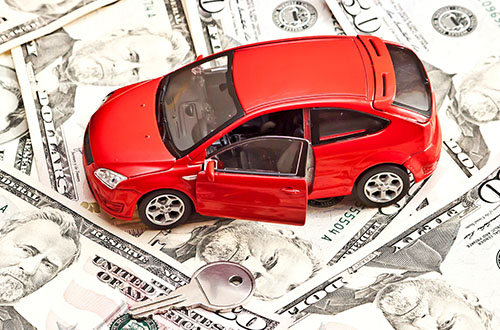Buy a New or Used Car: Comparing the Options
 If nothing else, having options is usually less stressful than having none at all. However, when confronted with the decision of purchasing a new vehicle or a used one, many drivers find themselves tortured and/or overwhelmed with the decision. This is an understandable struggle. If you drive more than an average commute for work, for example, you could say that a new car is practical because it could handle the extra wear and tear with ease.
If nothing else, having options is usually less stressful than having none at all. However, when confronted with the decision of purchasing a new vehicle or a used one, many drivers find themselves tortured and/or overwhelmed with the decision. This is an understandable struggle. If you drive more than an average commute for work, for example, you could say that a new car is practical because it could handle the extra wear and tear with ease.
But on the other hand, why spend all that money on a vehicle whose depreciation value is accelerated by the simple factor of more mileage than usual? Additionally, the onslaught of technology enables you to access comprehensive past ownership history with nothing more than the vehicle’s VIN identification code. This argument could go on for pages, and one could argue just as may pros for a new car as she could for a used one.
The truth is, there is no right decision when choosing whether to buy a new or a used vehicle. Instead, there is only the best choice for you yourself.
Whether you decide to purchase a vehicle that is new to you or to the world at large, having as much information as possible will enable you to be comfortable with your choice for the thousands of miles of driving that awaits you.
What is the Most Comfortable Option?
On average, Americans spend nearly three-hundred hours in a car annually. Therefore, the meaning of the word comfort itself or the question What is the most comfortable option for you and your family comes to mind. Comfort can refer to style, reliability, affordability, accessibility or safety, among other qualities. But most often, it is a combination of those characteristics that ultimately makes a person choose a certain vehicle. If you are the type of person who relishes in financial comfort, opt for a used vehicle. If the smell of a new car transports you to a place of utter contentment, get yourself to the closest new car dealership. If you are still undecided and want to feel completely informed when make your decision, read on.
Qualifying for Credit and Interest Rates: Which Option is Better?
Understanding credit and interest rates can be an overwhelming and frustrating process. However, by making yourself well-informed, you will have a clearer understanding of your options and the best choice for you and your lifestyle. Having “Good” or “Excellent” scores certainly helps keep down interest rates and expands options as far as how much money you may borrow. However, purchasing a vehicle if you have less than perfect credit is often still an option, as long as you are willing to pay an increased interest rate. The amount of money you are able to put down on either a new or used vehicle will also have an impact on your interest rate.
Fortunately, today’s internet resources make it increasingly easy to educate yourself prior to approaching a car dealer or lending institution. Free online credit score reporting services enable you to know and understand your score and rating, offer ideas for improving your credit score and identify reasonable borrowing options. These services also provide a loan payment calculator, which calculates various interest rates and monthly cost scenarios so that you can be aware of your options without the pressure of needing to decide when you are standing in the middle of the car dealership.
In general, interest rates are based on your credit score, debt-to-income ratio, down payment, amount you plan to borrow and the age of the vehicle. While the following statement may seem counter-intuitive, the truth is that, because of depreciation rates, loans for used cars typically have a higher interest rate than those loans for brand new vehicles. Used car loans also typically come with shorter terms.
In addition to the above information, we have compiled the following lists to help compare pros and cons to both new and used vehicles so you can make the best decision for yourself.
Top 3 New Car Pros
1. Nothing can replace the new car spell
2. Comfort in knowing it doesn’t have any issues
3. Purchasing a new car is simply easier than purchasing a used one
Top 3 New Car Cons
1. Significantly higher up-front costs
2. Significantly higher monthly insurance costs
3. Rapid depreciation rate
Top 3 Used Car Pros
1. Yield the best value on the market (especially for models less than three years old)
2. Substantially lower in tax and ownership expenses
3. Original owner absorbs the depreciation
Top 3 Used Car Cons
1. No way of knowing the full history of the vehicle
2. Notion that you are simply inheriting someone else’s problems
3. Depending on the age of the car, warranty coverage may or may not be available unless you purchase an extended warranty on your own
If you are interested in a used car, you may find yourself drawn to the option of purchasing a Certified Used vehicle. These types of vehicles are relatively new cars with low mileage sold by the brand’s dealership network. By definition of the Certified Program, these vehicles have not been in a major collision, and they have been inspected and refurbished as needed by the dealer. These vehicles will be sold like a new vehicle, but most importantly, come at an often significantly lower purchase price. Cars in this category include warranty extensions honored by the manufacturer’s dealership.
It is important to note, however, that “certified” stickers on cars at independent dealerships are not part of the Certified Used vehicle program. While a Certified Used car is a bit more expensive than a used car that is not certified, they are usually available with used car financing deals that aren’t typically offered otherwise. And you may decide you can’t put a price tag on the added assurance that your used vehicle has been well cared for.
Another safe and affordable option for a used vehicle can be car rental agencies, particularly those that are part of a national chain. These establishments pride themselves on providing safe, reliable and clean vehicles. Therefore, the depreciation value is typically usurped by the rental agency and most of these vehicles are gently used with minimal mileage.
The Bottom Line
Like any decision in life—especially those that have long-term ramifications—the process of deciding whether to buy a new or used vehicle can be a complex one. Fortunately, the internet makes researching both car types and specific vehicles a breeze. Identifying the most important aspects of owning a vehicle for yourself as well as your financial credit score and budget are critical components of deciding whether a new or used vehicle is the best option for you. You can either allow yourself to be overwhelmed by the decision-making process, or you can appreciate that you have options and remember that there truly is no right or wrong answer when purchasing a “new” vehicle or one that is simply “new to you.”
The best option, therefore, is to choose the vehicle type that makes the most sense for you, your income bracket and your lifestyle.



